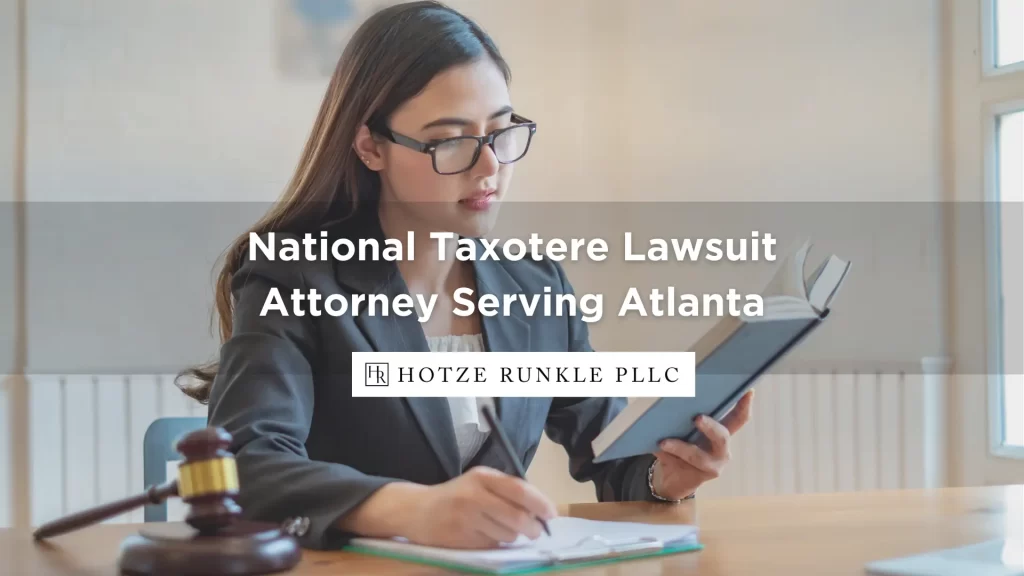
If you’re experiencing severely watery eyes after treating your cancer with the chemotherapy drug, Taxotere, Hotze Runkle PLLC and our Atlanta Taxotere attorneys might be able to represent you in a case against the drug manufacturer. Studies have shown that Taxotere chemo can cause a range of adverse side effects, such as excessive tearing and blurry vision related to an ocular condition called canalicular stenosis.
While Taxotere is most commonly used to treat breast cancer patients, it’s also used to treat individuals with various cancers, including cancer of the prostate, head, neck, and stomach. Whether your regimen is once a week or every three weeks, you can develop canalicular stenosis if you don’t receive immediate medical care from an ophthalmologist when symptoms appear. When it’s not treated early, it can become a permanent condition.
If you’re suffering from canalicular stenosis, you should contact the Atlanta, Georgia Taxotere attorneys to hold the pharmaceutical company accountable for its dangerous drug. We’re ready to fight for justice against big pharma and ensure they pay for their negligent actions.
To learn more about your options, take our Taxotere Quiz.
The Link Between Taxotere and Canalicular Stenosis
Sanofi-Aventis manufactured Taxotere to treat breast cancer, stomach cancer, prostate cancer, head cancer, and neck cancer. The drug belongs to a class of drugs known as taxanes, which slow the growth of cancer cells and stop it from spreading to other parts of the body. The regimen your oncologist will choose to administer Taxotere depends on the type and stage of your diagnosis.
After marketing the drug for years, Sanofi-Aventis finally released warnings about its possible adverse reactions in 2014. That prompted breast cancer survivors and their families to file lawsuits against the company for its failure to warn consumers and users about Taxotere’s dangers. They alleged that Sanofi-Aventis knew it could cause physical harm but never disclosed that to the U.S. Food and Drug Administration.
The canaliculus, which is an eye structure responsible for funneling tears from the tear duct into the nasal cavity, becomes inflamed during Taxotere chemo. This inflammation occurs when secretions from Taxotere come in direct contact with a patient’s tears. Chronic inflammation leads to an infection that blocks the canaliculus and prevents tears from traveling through it. That creates a symptom called epiphora, which is excessive eye-watering.
If you start treating this symptom in its early stages, an ophthalmologist can monitor it and prevent more severe damage from developing. However, if it progresses, it can lead to a diagnosis of canalicular stenosis, which is when one or both canaliculi become permanently blocked or closed.
Taxotere Symptoms You Shouldn’t Ignore
The symptoms associated with canalicular stenosis include:
- Headaches
- Epiphora (watery eyes)
- Cystoid macular edema (loss of vision)
- Sensitivity to light
- Dry eyes
- Cloudy eye lens
- Swollen eyelids
- Blurry vision
- Keratoconjunctivitis sicca (dry eyes)
- Eye infections
If you’re treating your cancer with Taxotere at Atlanta Cancer Care or another oncology facility and notice unexpected symptoms, you should seek care from an ophthalmologist immediately. These symptoms might be minor in the beginning, but if you don’t treat them promptly, they can lead to a permanent ocular condition.
What Should I Do If My Doctor Diagnoses Me With Canalicular Stenosis?
Unfortunately, some cases of canalicular stenosis are irreversible. If the damage progresses beyond a certain point, the only option you have is to undergo a medical procedure that aims to manage the symptoms. During DCR, dacryocystorhinostomy, a doctor will use existing eye structures to create a passageway so tears can bypass the damaged canaliculus.
In advanced cases, DCR isn’t an option because there are no viable structures the ophthalmologist can use to facilitate the flow of tears. When that happens, they might have to try conjunctivodacryocystorhinostomy (CDCR). During CDCR, a Jones tube, which is a tiny glass tube, replaces the damaged canaliculus so tears can drain adequately.
Although the surgeries may be painless, they’re expensive and invasive. Performing surgery on sensitive structures in the ocular cavity poses a range of risks and can lead to side effects worse than the symptoms of canalicular stenosis, such as:
- Bleeding during and after surgery
- Permanent facial scarring
- Further eye infections
- Displaced or rejected Jones tube
- Blindness
- Ineffective procedure
- Tissue damage
Can I Continue Chemo During Canalicular Stenosis Treatment?
Yes. If you’re undergoing chemotherapy treatment at the Northside Hospital Cancer Institute or another facility in Atlanta, it’s perfectly safe to continue while a doctor performs procedures to manage your canalicular stenosis symptoms. It’s crucial that you let your oncologist know about the side effects you’re experiencing from Taxotere so they can get you on a new drug.
Your oncologist and ophthalmologist will both monitor your health and symptoms to prevent the condition from getting worse. However minor a reaction might seem, you should always notify your doctor and ask if it’s a normal side effect or something to investigate further.
Who Can I Sue for My Taxotere Symptoms?
Since Sanofi-Aventis hid the dangers of Taxotere from consumers, patients, and doctors, your oncologist was likely unaware of the side effects you developed. The party you should file a lawsuit against is Sanofi-Aventis. They had scientific proof that their drug could lead to some debilitating symptoms but chose profit over safety.
Whether you have one symptom or multiple, minor or severe, you can seek compensation from the pharmaceutical company for their participation in failing to warn the FDA and public about the problems caused by Taxotere.
For a lawsuit to be successful, you need to show negligence existed. There are five basic elements of negligence you need to show in the evidence you submit during the lawsuit:
- Duty: The manufacturer had a duty of care to reasonably prevent an injury to the Taxotere user;
- Breach: They breached that duty;
- Cause in fact: You wouldn’t have developed symptoms if it wasn’t for the drug company’s careless actions;
- Proximate cause: Your diagnosis was the direct cause of Sanofi-Aventis’ negligence; and
- Damages: You incurred damages.
One of the most important pieces of evidence you can provide is medical records from the facility in Atlanta you went to for Taxotere treatment, such as the Cancer Treatment Centers of America. Your records will contain information regarding the chemo drug you treated with and the symptoms you developed. There will be dates to show a jury that validates your claim that Taxotere caused your diagnosis of canalicular stenosis.
The Damages Awarded in a Defective Drug Case
When a pharmaceutical drug leads to an injury and damages, that’s known as a dangerous drug or product liability case. The compensation you pursue in a lawsuit is for the damages you suffered from the dangerous drug. There are two types of damages awarded in a lawsuit: economic and non-economic.
Economic damages are actual expenses, such as:
- Hospital and physician bills
- Out of pocket expenses
- Prescription medications
- Loss of earnings
- Lost future earning capacity
Non-economic damages are physical and psychological harm, such as:
- Pain and suffering
- Emotional damage
- Loss of consortium or companionship
- Permanent disability
- Disfigurement
There’s also a third category known as punitive damages. They’re less common in product liability lawsuits, but they’re available in situations involving especially outrageous acts of negligence. Instead of reimbursing your losses, it’s an attempt to punish the party responsible for your injury and prevent them from committing similar acts in the future.
To file a lawsuit in Atlanta, you have to follow a three-year statute of limitations. It’s a strict deadline that allows the victim of product liability to sue the responsible party up to three years from the date the injury occurred. In other words, you must file suit against Sanofi-Aventis within three years after you notice the side effects of Taxotere chemotherapy.
Do I Need to Hire a Lawyer?
 You can choose to file a lawsuit without the help of an experienced Atlanta Taxotere canalicular stenosis lawyer. However, it would be an uphill battle with complicated procedures and complex requirements. If you never pursued compensation in a product liability case before, you’ll probably miss a deadline or forget to complete a crucial step. A mistake can cause the judge to dismiss your case.
You can choose to file a lawsuit without the help of an experienced Atlanta Taxotere canalicular stenosis lawyer. However, it would be an uphill battle with complicated procedures and complex requirements. If you never pursued compensation in a product liability case before, you’ll probably miss a deadline or forget to complete a crucial step. A mistake can cause the judge to dismiss your case.
Hotze Runkle PLLC will know how to navigate the legal road ahead of you. When you hire us, we will open an investigation immediately and begin collecting evidence that proves Taxotere caused your symptoms. We can request copies of medical records, speak to friends and family who witnessed the negative effects of your canalicular stenosis, and determine the value of your case.
We understand the emotional, physical, and financial toll this experience has taken. It diminished your quality of life and led to greater dependency when performing tasks you found to be simple before your symptoms developed. An injury from a harmful drug can upend anyone’s life and create a new set of obstacles to overcome.
Hotze Runkle PLLC May Be Able to Represent You
You won’t be alone in your fight for justice. Our Atlanta Taxotere canalicular stenosis lawyers will provide you with legal advice and support throughout your case. We will work hard and use all the resources at our disposal to see that Sanofi-Aventis pays you the money you deserve.
We sympathize with the burden you’re facing and don’t want to do anything to add to it. That’s why we will provide a free consultation, so you understand what your rights are and don’t feel pressured into moving forward with your case if you’re not ready. If you want to find out if you’re a candidate for a Taxotere lawsuit, take our Case Evaluation Quiz today.